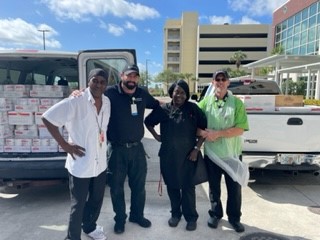Healthy Lee and Lee Health Join Forces on Food Security Program
Exercise and NutritionPosted:
America observes Memorial Day as a time to remember and celebrate those who have died in our nation’s wars, of course. The holiday also marks the unofficial start of summer, which promises family barbecues and foods such as grilled meats, potato salads, corn on the cob, baked beans, potato chips, and apple pie.
However, many families lack the economic means to enjoy such a bounty of food. According to a recent poll, more than 66 percent of parents reported choosing between buying healthy food for their family or paying for an emergency or unexpected expense like a car repair or medical bill.
The poll also revealed that more than 75 percent of Floridians say the rising food costs and other essentials have made it difficult to afford healthy food for their families. We can all agree that rising consumer prices have dinged our wallets and purses, but for some folks, the harsh reality has left their cupboards empty—and their stomachs.

From left to right: Melvin Curry (Salvation Army); Tim Unger, GCMC dining services manager; Ann Harris (Salvation Army); Tom Dudley, GCMC cook.
To help in the fight against hunger in our communities, Lee Health launched its Surplus Hurricane Supply Food Donation program in June 2022. Developed by Healthy Lee, the initiative safely diverts hospital food to organizations that feed people who are food insecure, which means they lack consistent access to enough food for every person in their home to live an active, healthy life.
Lee Health campuses at Cape Coral Hospital, Gulf Coast Medical Center, Lee Memorial Hospital, and HealthPark Medical Center participate.
The program has diverted more than 20,000 meals to area nonprofit organizations that feed the hungry, such as The Salvation Army, Community Cooperative, Grace Lutheran Church, the Empowerment Center, St. Mathew’s House, Feed My Families, and Café of Life.
In March, Gulf Coast Medical Center donated to The Salvation Army.
Shallah Ashworth, director of Development with the Salvation Army, says initiatives like the Lee Health Surplus Hurricane Supply Food Donation program help “breaks barriers toward food insecurity.”
“People who are food insecure face challenging obstacles on a number of levels,” Shallah says. “For example, from a technological standpoint, some don’t have access to a computer or have basic phone service. Many also don’t have reliable transportation to regularly shop at grocery stores.”
She says the Salvation Army uses the donated foods to prepare meals at its community resource centers, including its main campus in Fort Myers on Edison Avenue. The centers, which offer both lunch and early evening sit-down meals, serve about 1,000 families a month at three food pantries.
Heather Wayco, director of Clinical Nutrition/Patient Experience Cohort at Lee Health, says Florida healthcare regulators require facilities like Lee Health, as part of its emergency management plan, to establish a 7-day emergency food menu for hosted patients during a disaster.
“For each patient, the requirement is food service three times daily and a daily menu that provides five ounces of protein, starches and vegetables, milk or dairy items, and water for each patient,” Heather explains.
Most of the emergency foodstuffs come in bulk size or no. 10 cans, the size of cans often used by restaurant prep kitchens.
“We keep a surplus of these foods, which include cans of tuna, chicken, ravioli, single-serve boxed cereals, juice and fruit cups, packages of cookies, graham crackers, granola bars, powdered milk, and so on,” she says. “In the event we don’t use these emergency foods, and three months before their expiration date, instead of discarding the foods, we donate them to our community partners who serve our vulnerable population.”
Tim Unger, Dining Services manager with Gulf Coast Medical Center, says foodstuffs left over from special events at the hospital or its café are also safely diverted to the donation program.
“Sometimes we’ll have a product that we used once or twice, such as at our café or during a special event, and long before its expiration date, we’ll add it to the donation list,” Tim says. “This way, food isn’t wasted, but more importantly, it helps people who are food insecure. There’s a need in our community for this type of program, and to be able to reach out and help support agencies like the Salvation Army is a special feeling.”
In Southwest Florida, 1 in 10 people and 1 in 8 children face hunger.
“Our response is one of great thankfulness,” Shallah says. “Any time an organization like Lee Health thinks of us, that means they realize the work we’re doing and some of the obstacles we’re facing. Their donations are helping to take care of community folks who are facing a crisis.”

